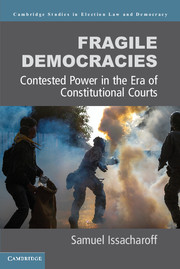Book contents
- Frontmatter
- Contents
- Preface
- Introduction: The Burden of Modern Democracy
- PART I MILITANT DEMOCRACY
- PART II COMPETITIVE DEMOCRACY
- 6 Giving Up Power
- 7 The Promise of Constitutional Democracy
- 8 Transition in South Africa
- 9 The Era of Constitutional Courts
- 10 The Constitutional Bargain
- 11 Can Law Protect Democracy?
- 12 Constitutionalism in the Time of Fragile Democracies
- Epilogue: Democratic Objectives
- Index
8 - Transition in South Africa
from PART II - COMPETITIVE DEMOCRACY
Published online by Cambridge University Press: 05 July 2015
- Frontmatter
- Contents
- Preface
- Introduction: The Burden of Modern Democracy
- PART I MILITANT DEMOCRACY
- PART II COMPETITIVE DEMOCRACY
- 6 Giving Up Power
- 7 The Promise of Constitutional Democracy
- 8 Transition in South Africa
- 9 The Era of Constitutional Courts
- 10 The Constitutional Bargain
- 11 Can Law Protect Democracy?
- 12 Constitutionalism in the Time of Fragile Democracies
- Epilogue: Democratic Objectives
- Index
Summary
The modern wave of democracies would have been inconceivable without the collapse of the Soviet Union. Most apparently, the removal of the Soviet armed presence allowed the mobilization of democratic forces without the threat of the invasions of Hungary in 1956 and Czechoslovakia in 1968. The impact of the demise of Soviet power reaches much further, however. The easy divide of the world along the Cold War lines of demarcation ended, with far-reaching consequences. The American patrons of right-wing regimes reexamined their commitment to nondemocratic rulers once freed from the need to maintain the anticommunist alliance. Similarly, client states of the Soviet Union from outside the Soviet bloc found their benefactor and, oftentimes, financier suddenly unresponsive. For the Cubas and El Salvadors of the world, one on each side, the realignment forced a recalibration of authoritarian rule in a seemingly post-authoritarian world.
Realignment was not limited to those holding state authority. The end of the Cold War also commanded the agenda of those contesting the lockhold on power of the client regimes of the major powers. For every military regime in Central America counting on American support there was at least one guerilla group drawing sustenance from the Soviet Union or its regional proxy, Cuba. For every Soviet satellite in Africa or Eastern Europe there was a corresponding challenge from some group funded directly or indirectly by Western sources. The prompt toward democracy after 1989 did not need to be triggered by the sudden withdrawal of Soviet troops. It could as easily have been the product of the collapse of the corresponding Cold War patrons and the need for national accommodation of competing political factions.
No country seems more removed geographically from the Cold War struggle than South Africa. The National Party (NP) government was no mere American puppet, and in its final stages, the apartheid state had to withstand increasing economic sanctions from its Western allies.
- Type
- Chapter
- Information
- Fragile DemocraciesContested Power in the Era of Constitutional Courts, pp. 166 - 188Publisher: Cambridge University PressPrint publication year: 2015



